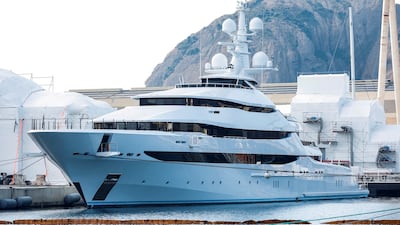Gibraltar auctioned a $75-million superyacht linked to a Russian steel billionaire under sanctions on Tuesday.
US bank JP Morgan said The Axiom's alleged owner Dmitry Pumpyansky had reneged on the terms of a €20.5m ($20.4m) loan, leading authorities in Gibraltar to impound the luxury yacht in March.
The Gibraltar Admiralty Court auctioned the 72.5-metre vessel through a system of closed bids that were supposed to be sent electronically by noon on Tuesday, a court spokesman said.
The court added that 63 bids had been submitted for consideration, with the selection process expected to take 10 to 14 days.
There was an “unexpected late surge by prospective buyers” around the world for the vessel, Nigel Hollyer, broker to the Admiralty Marshal of the Supreme Court of Gibraltar, who led the auction, told The Guardian newspaper last week.
The boat can accommodate 12 people in six cabins and has a swimming pool, a spa, 3D cinema and water sports equipment.
According to court papers reviewed by Reuters, JP Morgan lent €20.5m to British Virgin Islands-listed Pyrene Investments, which was owned by Furdberg Holding Ltd.
Furdberg's owner was Mr Pumpyansky, 58, who acted as guarantor for the loan.
The papers said Pyrene Investments defaulted on the loan terms after Mr Pumpyansky transferred his shares in Furdberg to a third party on March 4 and was then hit with sanctions, blocking the repayment of the loan.
Superyachts owned by Russian oligarchs — in pictures
The Russian magnate, who has an estimated fortune of $2 billion according to Forbes magazine, was placed under sanctions by Britain and the EU shortly after the invasion of Ukraine.
Mr Pumpyansky was until March the owner and chairman of steel pipe manufacturer OAO TMK, a supplier to Russian energy company Gazprom. The company said he had since withdrawn from the business.
The Axioma is the first seized luxury yacht known to be auctioned since the West imposed sanctions on powerful Russians after the February invasion of Ukraine.
Oligarchs and UK sanctions — in pictures
Sources close to the process told Reuters that JP Morgan would only claim the €20.5m owed and that any further proceeds from the sale would be up to the court to disburse.
Scores of yachts and houses linked to Russian oligarchs have been seized by governments around the world since the invasion.
British and American authorities have said they would seek to send the proceeds of sold assets to Ukraine.
A Gibraltar government source said the money would probably be frozen, rather than handed to anyone other than the oligarch.
A spokesman for JP Morgan declined to comment.
Two luxury yachts owned by Russian oligarch seized in France — video
James Jaffa, a lawyer for British firm Jaffa & Co, which specialises in yachts and represented The Axioma before it was seized, said the vessel could sell for “way below” €20m.
After the auction, the ship broker, crew wages, the shipyard and maintenance would need to be paid before the bank, he said.
A successful sale would, nonetheless, be a “benchmark” for other banks looking to recoup losses by auctioning the repossessed property and other assets of sanctioned oligarchs.
“Axioma will be a watershed moment for assets that have bank financing against them because all the other banks will realise that the asset can be sold and that they can get some or all of their money back,” he said.
However, he said assets without financial claims against them, which were seized by governments because of sanctions alone, would be harder to sell.



























